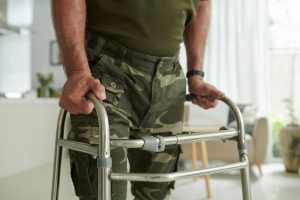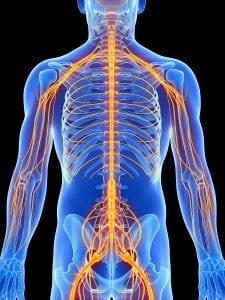On March 20, 2025, we will stop accepting new Military Disability Made Easy subscriptions. For more information about how this change may impact your subscription, click here
Rating POTS for Military Disability
- Published:
- Last Updated: February 22, 2024

I want to discuss how to rate a condition that we are asked about quite a bit: Postural Orthostatic Tachycardia Syndrome (POTS).
POTS is an odd condition. Period. The cause of POTS is not very well understood medically, and the symptoms can differ dramatically from one person to the next. The only symptom that is common in every case of POTS, and is literally defined in its name, is a significant increase in heart rate (“tachycardia”) when transitioning into an upright position (“postural orthostasis”). Basically, anytime anyone with POTS stands up, their heart starts racing.
Other symptoms of POTS can include chest pain, dizziness, weakness, blurred vision, fainting, migraines, trouble sleeping, chronic fatigue syndrome, and more.
Some cases of POTS are thought to be a type of partial dysautonomia. Dysautonomia occurs when the part of the nervous system that controls the heart, intestines, blood vessels, bladder, etc., does not properly communicate with these organs/systems.
Other cases are attributed to things like low blood volume or other conditions like diabetes.
Assigning a Military Disability Rating for POTS can be tricky, especially since each case can be so different.
Since the VASRD does not have a VASRD Code for POTS, it has to be rated analogously under the condition that is closest to it. Again, since each case of POTS is unique, finding the best analogous code(s) can be tricky.
The first thing to consider is the underlying cause for your POTS. Dysautonomia? Diabetes? Whenever rating conditions for Military Disability, always look at the bigger conditions that cause any of the smaller conditions/symptoms first. Many times, a single rating for that larger condition will cover the smaller conditions and will be the only thing that needs to be rated.
Remember the Pyramiding Principle! This principle states that a single symptom can only be rated ONCE, so if it is used to rate a larger condition, it is already rated, and cannot be given an additional rating or be used at all in another rating.
Let’s look at a quick example to better illustrate these rules. Let’s say Vicki has POTS. Her doctor determined that her POTS was caused by dysautonomia from a damaged vagus nerve. Her only symptoms are a high heart rate and high blood pressure. Since the vagus nerve is the cause of the condition, we should first look at the ratings for the Vagus Nerve. We find in the discussion on our site that “damage to the vagus nerve often results in high heart rate and high blood pressure,” so we know that a rating for the vagus nerve already covers both of her symptoms. Vicki will then only receive one rating for the vagus nerve since that one rating covers everything. She has nothing additional to rate separately.
If the underlying cause can be rated, and that rating covers everything, then rating POTS can be simple. In many cases, however, things get a bit muddier. If the condition that caused POTS either doesn’t have its own rating or doesn’t cover everything, then individual symptoms can be rated separately, again only as long as each is only rated once.
Let’s look at another example. Let’s say Gary has POTS. His POTS was caused by diabetes. His symptoms include dizziness, fainting, high heart rate, weakness, and the inability to exercise (low physical activity level). First look at the rating for Diabetes. In the discussion of rating diabetes, it clearly states that secondary conditions (POTS, in Gary’s case) can be rated separately. Because of the Pyramiding Principle, however, we know that we can’t use any of Gary’s symptoms that are already covered by his diabetes rating.
So, looking at the ratings for diabetes, we see that it includes weakness and low physical activity level. Those are covered under Gary’s diabetes’ rating, so now we are left with dizziness, fainting, and a high heart rate that still need to be rated.
When deciding which symptom to rate next, choose the one that is the most dominant. Since high heart rate (tachycardia) basically defines POTS, then that should be the one we rate next. If you search for tachycardia on our site, you’ll find that it is rated under code 7010, supraventricular arrhythmias. Gary will get one rating under this code. This code does not cover the dizziness or fainting, however, so those symptoms still need to be rated.
Both dizziness and fainting are symptoms of peripheral vestibular disorders (balance disorders), and so Gary can receive one final rating under code 6204.
Now all of Gary’s POTS symptoms have been rated, but each only once. In total, Gary will receive three separate ratings: one for diabetes, one for tachycardia, and one for a balance disorder.
When figuring out how best to rate your POTS, start with the underlying cause and work outward until all symptoms are properly covered. Remember, however, that the Rating Authorities have the ultimate say in how every condition is rated. They will determine each case separately, and they have the power to decide how to rate each case of POTS in whatever way they think best. The principles discussed in this blog are the guiding factors for the Rating Authorities, but they may interpret things slightly differently. Ultimately, it is always up to them.
Recent Posts
TDRL vs. PDRL—Which is better for disability benefits?
February 13, 2025
Leukemias and Multiple Myelomas NOW on the Presumptive List
January 9, 2025
Two MORE Conditions added to the Burn Pit Presumptive List
January 3, 2025
The 2025 VA Disability Rates are here!
December 2, 2024
About Us










55 Comments
Thank you for posting this. I have been in for 12 years and last year started passing out every time I would run. I had never had any serious health conditions. This lead to uncontrollable tachycardia. At first I was diagnosed with Inappropriate Sinus Tachycardia, but after a year + of testing they have decided I have a autonomic nervous system disorder, POTS and DOPA deficiency. The med board process is going to start soon and before reading your blog I honestly had no idea what could happen. Thank you again!
Glad I could help. The MEB Process can be a bit overwhelming, so check out our website if you have any questions about that.
http://www.militarydisabilitymadeeasy.com/medicalevaluationboard.html
And, of course, if you ever have additional questions, feel free to contact us anytime, and we'll help guide you the best we can.
Can you stay in the military with POTs or is an automatic MEB referral? My dr suspects I may have pots. I fit the criteria just waiting to see cardiologist. My GP wants me to start a beta blocker but won't that mask symptoms before seeing cardiology?
POTs is not an automatic MEB referral. It all depends on your systems and their severity. If they interview with your ability to properly perform your job requirements, then, yes, they will refer you to the MEB. If not, they could choose to keep you on for some time.
I was in the military from 1997-2001 but diagnosed with POTS in 2013. Do you think I could get VA disability compensation? Based on other who have received benefits for POTS what percentage disability were they awarded?
Honestly, no. Unless you can provide proof that your POTS was a direct result of your military career, which is highly unlikely, you won't be able to get compensation for this. And because of how tricky it is to rate POTS, it's impossible to predict the percentage without knowing full details about the case. Ultimately, however, it seems very unlikely that your condition is related to your military service. It's been too long and is just as likely caused by other things. Sorry for the bad news.
I took tilt table test 4 days ago and I got fairly dizzy and my heart jumped to 151bpm during the test and I threw up some.
Gonna see my cardiologist on 23rd of feb and see what results he has for me. I have only been in the army for 1 year and really don't wanna get out because If I get out right now, I am only gonna get part of my GI Bill. If I get chaptered, I hope I get some money to start a new life. So far I have only been able to save up 3.5k in my bank 🙁 I am really concerned about it.
Hi Haider –
I'm sorry to hear about your situation. The results of this test definitely don't sound promising, but depending on your official diagnosis, things may not be too bad. Some conditions that are indicated by a positive tilt table test can be treated, and so won't necessarily make you unfit for duty. Ultimately, however, until the official diagnosis is made, it's impossible to really say what is going to happen. The next time you meet with your physician, discuss treatment options and definitely address the possibility of remaining on duty. If you are diagnosed with something that cannot be treated enough to have you remain on duty, then you should be given a significant rating that will help compensate your for your condition. Again, impossible to say without a diagnosis and full details.
Hi,
Anyone who read it. I thought I should update here. My tilt test table came Negative but the doctors are convinced that I have POTS. So I will start my Med Board next week.
I started my Meb last week. Got to a few briefings. Today I scheduled my VA meetings I am looking forward for this process to get over pretty soon
I was just wondering if you can update what happened to ur case? I started my meb for POTS recently ur input will be great!
Seems my pots was temporarily caused by medication I was on. One I stopped it it resolved slowly in about a month. It was documented on several DR visits. By the time I got to the cardiologist it was resolved. I had night sweets as well which when I told my GP he had me stop the medication suspected and he was right.
I just got my official formal PEB back. I have not worked for over 18 months but was found fit. My attorney submitted an appeal and I was found unfit for AUTONOMIC NEUROPATHY / CHRONIC POSTURAL
ORTHOSTATIC TACHYCARDIA SYNDROME, CHRONIC MIGRAINES. They did not find me unfit for Ehlers-Danlos since I can control most of the joint hyper mobility with bracing and they felt if it were not for the other two issues, I could perform as an LPO on shore duty. Now just to wait and see what the VA comes back with.
Sounds like they made a fair judgment. Good thing the appeal was successful. Luckily, the VA will rate all of your conditions, so hopefully they'll give you a fair rating right off the bat, and you'll be good to go.
Can I join the navy with POTS? I've been on medication for the past year and it seems to have stopped all my symptoms. Apart from postural tachycardia I am fit and healthy, I don't know if having this condition will make me fail the medical and I would be most grateful for your advice. I also spoke to a recruitment officer and they said that due to me being on medication it's unlikely that I will be able to join. I am worried that because I used to faint (due to the POTS) my application won't even be considered. Thank you.
I guess I'm just looking for advice, help, something I all this mess haha. I joined about six years ago, about two years after had a ninety pound weight gain in three months, started having IST, insomnia, syncope. As quick as the weight came on, it came off with rapid weight loss but other symptoms continued and varied; migraines, gastroparesis, complete peripheral neuropathy , lyringa(sp?) spasms, heat intolerance, memory loss, some urinary issues, falling and hitting my face on tables. It's a humiliating thing but after several specialists I was diagnosed with dysautonomia. That was 2 years ago. Work understands my symptoms and has been cautious but they prolonged putting me in for MEB, that was started two months ago but what now, how does someone who has something that varies on the day, the weather, may feel pretty good one day and not be able to walk to next get rated ?
Hi Lucy –
Your concerns are valid. Even though POTS is under control currently, it could worsen in the future. Depending on your potential MOS and the needs of the Navy, you MAY still be able to join, but you will be much lower on the list. For the majority of MOS's it will disqualify you. It's up to you on whether or not to still try, but it will definitely make it harder, no question.
Hi Devyn –
Sorry to hear about your case. I actually have a blog about rating dysautonomia that you might find interesting:
http://blog.militarydisabilitymadeeasy.com/2014/07/rating-dysautonomia-for-military.html
The key is to make sure that your symptoms are thoroughly documented by your physician. So make sure to see him regularly and that he keeps thorough notes. You might want to also start working with him on keeping a daily diary of your symptoms that he reviews and signs off on so that they are thoroughly documented.
With documentation like this, the raters will be able to go through everything and see your most prominent symptoms and how they affect your life. They can then get an idea of how your overall conditions interferes with your daily living and determine what rating best reflects your overall disability.
I realize this is an old thread, but I'm still hoping for some clarity.
I'm Zack, and I was discharged from the Air Force almost a month into basic training after passing out in the barracks (general discharge because I was in for such a short time). It has taken me until now to get a definitive diagnosis of POTS, and my condition has only worsened since that first incident. I am completely unable to work, and am on medication now to manage day to day.
Do you think I can qualify for VA disability benefits? It would seem my POTS was triggered initially while in the military, so would this be proof enough for the VA?
For some clarity, I had no previous history of syncope before that point in basic training, which was in early 2012
It definitely wouldn't hurt you to apply, but I have to be honest that it is going to be tough, if not impossible, to prove your condition. Normally a condition has to be officially diagnosed within 1 year of separation to be considered service-connected. Since it was just now diagnosed, you would have to have undeniable proof that the episode that occurred during the military was definitely the beginning of POTS. A letter from your physician claiming that it was would help your case, but may still not be enough.
The condition itself is also going to provide a problem since it is poorly understood and you were in service for such a short time. None of the recognized triggers (viral infection, surgery, etc.) were present in your case, which may indicate that it is more genetic (not ratable). Regardless, with such a short time in service, it is highly unlikely that the military experience itself is what triggered the condition. If they see it this way, your claim will be denied.
However, they might review all the evidence and instead judge in your favor. So you might as well submit a claim and see what happens. Just be prepared that it will most likely be denied.
Thanks for your response! I neglected to mention that this episode of syncope was directly following several days of being sick. It was either strep throat or the flu; the doctors were less than ideally communicative. I continued training while ill, as my training instructor would not allow me medical attention when requested. However, after I lost consciousness, he had me sent to the local hospital for evaluation, so there should be some records there. Though they were not shared with me.
Also, I do not think it will be difficult to have my primary doctor provide a detailed documentation of my symptoms and of this first incident. Thank you for your advice, and I do plan on applying for aid. Being stuck at home with no income, I will follow any possibility of assistance that I can get, even if it's a long shot.
Current Naval Aviator with 11 years flying fixed wing fighters. Went to Flight Doctor for symptoms including fatigue, shoulder back pain and fever (night sweats and chills) that were present for a few days prior to visit. Thought I might have the flu or some sort of bug. Doctor did orthostatic pressures to see if I was dehydrated and gave fluids (was not tilt positive for dehydration), but he noted spikes in heart rate. I am a very tall person 6'6" and have never had any of the associated symptoms of POTS. Do you think once the virus clears up and fever symptoms go away that the POTS symptoms will clear. Supine: 78 sitting: 94 Standing: 120… blood pressure remained constant 113:65?
With the right evidence you have a chance of being successful. Definitely do what you can to obtain those medical records from your service. Those will be necessary.
It's possible, but not definite. Only time will tell on what will happen in your case. There are cases where the symptoms do not become chronic, and others where they do.
Was it because you had uncontrolled passing out that they MERB you? Just trying to understand what about your condition made you unfit for duty.
I was diagnosed with POTS at the VA a little over a year after I got out. But, when I was in, I did report of the symptoms during my annual exams – like trouble breathing, dizziness, I had fell down the stairs before and lost control, was thought to be anemic so we ran blood tests, brain fog, and increased heart rate during activities and exercise. They will just tell me to lose weight. My neurologist said I can't balance because it's due to POTS. It got worse when I got out because I black out. What are my chances of proving this is service related and getting a rating for it.
If you were diagnosed within the first year after you were separated, you have a higher chance. The VA will service-connect most chronic conditions diagnosed within this first year, especially if there is evidence of the symptoms while still active duty.
If it was diagnosed more than a year after, it is much harder. You'll have to show concrete evidence of ongoing symptoms and regular diagnostic efforts. Ultimately, they may still deny it, but it's worth a shot to apply. With clear symptom evidence in service, you have a higher chance than most.
I have over 16 years in and in afraid I have pots. I have been monitoring my hr and seemed to not only be low resting in the 50s, even lower while sleeping mid 40s but as soon as I stand up it jumps over 25 within a minuite or so. A few years ago I had an heart stress test because I was concerned about my hr monitor on the treadmill bring so high so easily. Before I even got on the machine they got a baseline by having me sit for about 5 minuites once the nurse asked me to stand they immediatley told me to sit because it junped they consulted the doc in the back of it was safe to go on with the actual test and they said in fine. So I did the test took a good 3 minuites to get to the designated heart rate by walking and They basically said my heart is good and the heart of an athlete runner. And sent me on my way… could I be seperate for this since it's still the same issues except getting worse side effects?
A diagnosis of POTS alone won't make you unfit for duty, however if the symptoms start interfering with your ability to do your job or be deployed, then it could lead to a medical separation. Right now, however, it doesn't sound as though you have been officially diagnosed or started receiving treatments to control the symptoms. If properly diagnosed and treated, you may be able to continue your service.
I have recently discovered that I have POTS. In looking through my SMR it is apparent that I have had POTS symptoms for the past 23 years but was never tested for POTS in service or had my BP or heart rate tested in any other position than sitting. My symptoms started after returning from overseas. I became extremely confused, weakness heaviness in legs and arms, loss of feeling and strength in hands and feet, dizzy, racing heart, vertigo upon waking and standing , sleep disturbance 3-4 hours a night, nausea, extreme anxiety, etc… After relating my symptoms to the battalion doctor I was sent to psychiatry and I was diagnosed as having PTSD GAD and was promptly put psych on medications. These never helped but only made me dizzier and more cognitively dysfunctional. My ability to function kept getting worse. I was switched on and off psych meds for the last 7 years of my career. After leaving the service I had been seen in the military hospital system and at the VA. I have had all of my physical symptoms and complaints consistently written off as being caused by my PTSD GAD because all my blood work and seated BP and heart rate are in range even to this day. Although I was never tested or diagnosed with POTS in service I have multiple entries in my SMR showing complaints all consistent with POTS. As I understand that POTS is not a well known affliction today and was even less so back in the 1990s. Would this be able to be service connected as having been a misdiagnoses or by some other means ?
Potentially. The most important thing would be solid NEXUS letters from a specialist claiming that the symptoms seen in your SMR is undoubtedly undiagnosed/misdiagnosed POTS. With a strong enough NEXUS and enough clear evidence in your SMR, a claim could be successful.
I had those same conditions migraines 2-3 times a week, neuropathy in upper extremities 20% each side, brain fog, require saline 2 x week and medication to increase blood volume to prevent syncope and dizziness but they only rated the POTS at 10% code 7007 and offered me a service separation. I am requesting a formal board.
How did you choose your lawyer?
I have POTS, Ehlers Danlos, Dyautonomia, and Reynauds, but I think they may only consider the POTS because that was the only one diagnosed in service.
@GodsTowerMan sounds like they didn't consider your migraines and neuropathy unfitting. If your migraines made it impossible for you to work (completely prostrating) 2-3 times a week, then they definitely should be considered unfitting. Make sure they have proof of that. Neuropathy is not always unfitting, depending on the physical restrictions it causes, your MOS, etc. The more evidence you can show that your conditions made it impossible for you to do your job, the better.
I had 18 months of service when I was medically separated on the disqualifying diagnosis of "vasovagal syncope syndrome". Every doctor I saw, with the exception of one ER doctor, said I was probably having anxiety attacks. I lost consciousness three times, all during or directly following extended periods of heat and exercise, then had several ER visits of pre-syncope episodes. Documentation of tachycardia, numbness and tingling in extremities, dizziness, black spots in vision, lightheadedness. They referred me to a cardiologist who did the "old school" TTT and determined it negative for "vasovagal syncope syndrome", but diagnosed it anyway, saying it was probably caused by anxiety. I'd never heard of POTS at the time. When I got out, I went to a civilian therapist, who said it wasn't anxiety attacks, and told me to see a physician. Went to civilian doc on my husband's insurance, and within a month, he had conducted a positive TTT and diagnosed POTS, started treatment immediately. With treatment and reconditioning, I've improved slightly, but still feel unable to work full-time, and I'm having trouble finding part-time work that will allow for my medical needs. I filed for an increase in disability for Vasovagal and submitted the medical records from civilian doc. (Original rating was 0%) The VA says they want to do their own exam, but I'm terrified they want to do another TTT. I literally couldn't move for four days after the last one. Why can't they just accept the results from my civilian doctor? After reading the above, I'm starting to wonder if there's even a point in trying. Is there?
Because there is so much conflicting history in your records, the VA needs more than a single physician's opinion in order to rate you as POTS. The VA always performs a VA examination for disability claims, but will consider all medical evidence. VA exams, however, are not strictly required, so you can apply without it, however, they will probably end up stating that they do not have enough evidence in order to properly rate it. Which they don't, really, with a single medical opinion and years of conflicting evidence. If the VA's exam ends up agreeing with your civilian physician, then that will be enough for the VA to process your claim.
My daughter has been in the Airforce for 2 years in fuel systems. She climbs into fuel tanks . She was starting to experience rapid heart rate, dizziness and chest pain. After several trips to the ER we found her a cardiologist that did all tests possible. The tilt test showed she has POTS. Since she has to wear a respirator while going in a fuel tank, do you think this will cause her to get medically discharged. They still need to review her medical, so looking for opinions. She was held off of deployment in July because they had not diagnosed her at that point yet but now she is diagnosed with POTS.
A diagnosis of POTS on its own won't disqualify her from service, but if her specific symptoms are severe enough that they make it impossible for her to perform her duties or be deployed, then yes, they will have her physician refer her to the MEB and have her medically discharged. Ultimately, it will be up to her commander and doctor whether they feel that she can physically continue to serve.
If they decide no, make sure all the steps of the IDES are properly followed to ensure she receives the correct compensation.
http://www.militarydisabilitymadeeasy.com/integrateddisabilityevaluationsystem.html
I was diagnosed with POTS about 5 years ago and have since grown out of it. I have not showed any symptoms for over two years and it has not interfered with my life since. Am I still eligible to join the military? Should I tell my recruiter and work on getting a waiver? I’m not quite sure whether to hide it or to say something.
Without active symptoms, there is definitely a possibility that you could still join. Openly talk to your recruiter about it. You'll want to be open about it so that it is clearly recorded on your intake exam so if it recurs later in your military career, you'll have a stronger case for service-aggravation.
Thank you for this, im diagnosed with PTSD and POTS, I separate in 2 months from AD and went through an MEB for the pots, was put on a c code and return to duty, will this hurt my service connection? Would like to talk more to someone if possible, thanks!
Since your POTS was diagnosed while you were active duty, it will still be considered service-connected and eligible for VA Disability.
If you'd like more in-depth help, you can reach one of our disability experts through our All-Access Membership: https://militarydisabilitymadeeasy.com/get-all-access-membership.html
Anyone got more than 0% rating on POTS? Please help. Service connected at 0% here. Brain fog, palpitations, anxiety and unable to stand for long time is killing me.
To see if you qualify for a higher rating, we'd need to compare all of your symptoms (whether present at the time of rating or new) to the codes the VA chose to use to see if it can be increased or new ratings added. Our disability experts would be happy to go through all of them with you to see if there is potential for an increase. You can reach them through our website by becoming an All-Access Member (2-week FREE trial): https://militarydisabilitymadeeasy.com/get-all-access-membership.html
hi i’m looking to apply to the army (i’m 15- waiting until i graduate from high school) and i was diagnosed with pots a while back. my symptoms don’t impact my way of life at all and the only thing i get is a bit dizzy when i stand in the morning. i’ve never fainted, never been on medication and i can still run and walk and workout. should i go to my doctor to check if i still have it or go to the recruitment office and explain my situation?
Before going to the recruiter, you should have a current examination with an orthostatic intolerance test. An unsatisfactory result is considered disqualifying, but at that point with current evidence, you'll be able to discuss your options with the recruiter.
I was in from 2009-2013. During this time, I had frequent episodes of dizziness, chest pains, trouble breathing, and syncope or near-syncope during PT. Many of these instances are well-documented, as I was referred to pulmonology to rule out asthma and cardiology for chest pains. I also have witnesses (for buddy statements if required) to the syncope episodes. It was also about 9 months into my service that I began experiencing insomnia, which I am rated for under my PTSD/MDD. I have only just been diagnosed with POTS/dysautonomia via a tilt-table test earlier this month after experiencing an increase in symptoms over the last 7 months or so, and chronic fatigue for over a year now. I never experienced any of these symptoms prior to my TIS, and only intermittently after my discharge until recently. My TWC rep gave me no other information to help me with filing my claim. As far as I know, we do not know the underlying cause of my dysautonomia. How do I go forward in the claims process? TIA.
The key to your claim will be a Nexus Letter from your diagnosing physician stating that the symptoms you experienced first during service were "more likely than not" early symptoms of your POTS and then give medical rational linking your current diagnosis to those symptoms during your service. You will also need to submit as much evidence of those symptoms since service up to the present as possible to show continuity of your symptoms. Without these things, a claim for POTS will simply be denied.
I have plenty of evidence simply in complaints of shortness of breath, chest pain, insomnia (which is already rated under my PTSD/MDD). I was at one point diagnosed as having "exercise-induced asthma" because they couldn't find a cause for the shortness of breath. The passing out during PT is more difficult because they never sent me to sick call (my temp was never elevated enough to warrant the frequently-threatened thermometer-up-the-rectum ambulance ride). Also the dizziness and tremors, they thought I was having hypoglycemic episodes (my A1C once tested as pre-diabetic). Thank you for your response, I will contact my cardiologist and ask these questions as soon as possible.
I was rated 0%, in Nov 2019, for "neurocardiogenic syncope with carotid sinus hypersensitivity", as a blanket diagnosis for my passing out… the events that started my MEB and "couldn't" safely be treated because of Reynaud's. I've recently been re-diagnosed, by my local VA, as having POTS.
Since my syncope now has a name, should I fight for having my % raised and having the diagnosis properly renamed? While I was in, I went through SO many tests (brain scans, ekg, etc.), and they never figured it out. It took half a year, outside of the AF, to get this tilt table test and have my diagnosis.
You can definitely apply to have the diagnosis changed. While not essential, it will make things easier in the future if you apply for rating increases if the condition worsens.
Have your symptoms worsened since you were first rated the 0%? If you apply now, even with the change in diagnosis, it is unlikely that your rating will increase unless your symptoms have worsened. POTS is rated on the underlying condition/symptoms, so if the symptoms are already rated, it is unlikely to change without new or worsened symptoms.
What about if the method of treatment changes? They want to put me on a medication that will raise my blood pressure (which sounds dangerous to me) and I have to restrict my diet for life, as well as movements.
If the high blood pressure is a new symptom that isn't covered by your current ratings, then that could be rated separately. Dietary and activity restrictions are not usually ratable unless they result in undernutrition or other ratable conditions.